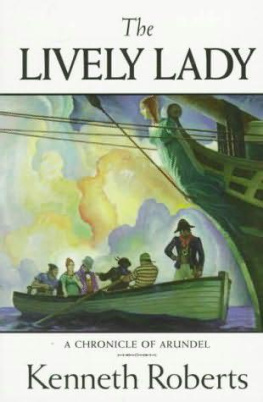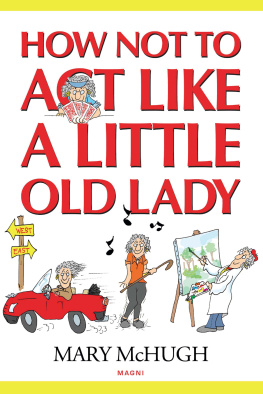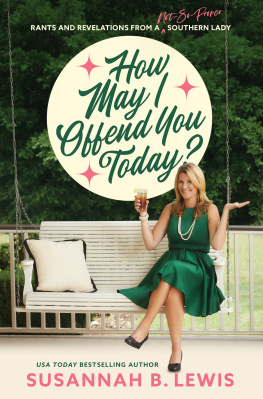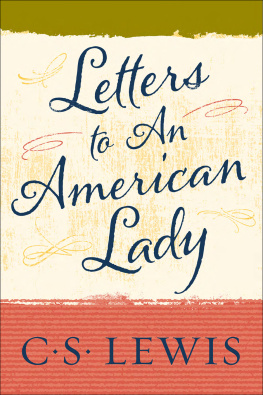Kenneth Lewis Roberts - The Lively Lady
Here you can read online Kenneth Lewis Roberts - The Lively Lady full text of the book (entire story) in english for free. Download pdf and epub, get meaning, cover and reviews about this ebook. year: 1997, publisher: Down East Books, genre: Art. Description of the work, (preface) as well as reviews are available. Best literature library LitArk.com created for fans of good reading and offers a wide selection of genres:
Romance novel
Science fiction
Adventure
Detective
Science
History
Home and family
Prose
Art
Politics
Computer
Non-fiction
Religion
Business
Children
Humor
Choose a favorite category and find really read worthwhile books. Enjoy immersion in the world of imagination, feel the emotions of the characters or learn something new for yourself, make an fascinating discovery.
- Book:The Lively Lady
- Author:
- Publisher:Down East Books
- Genre:
- Year:1997
- Rating:5 / 5
- Favourites:Add to favourites
- Your mark:
- 100
- 1
- 2
- 3
- 4
- 5
The Lively Lady: summary, description and annotation
We offer to read an annotation, description, summary or preface (depends on what the author of the book "The Lively Lady" wrote himself). If you haven't found the necessary information about the book — write in the comments, we will try to find it.
The Lively Lady — read online for free the complete book (whole text) full work
Below is the text of the book, divided by pages. System saving the place of the last page read, allows you to conveniently read the book "The Lively Lady" online for free, without having to search again every time where you left off. Put a bookmark, and you can go to the page where you finished reading at any time.
Font size:
Interval:
Bookmark:
THE LIVELY LADY
The Chronicles of Arundel Book 2
This was scanned by the scanner, proofed by the proofer and called (v1.0). My scans and/or proofs are done so I can read the books on my smart phone and or REB-1100 eBook reader. This electronic text is meant to be read by a reader...



THE LIVELY LADY
THE LIVELY LADY
KENNETH ROBERTS

DOUBLEDAY & COMPANY, INC.
Garden City, New York
COPYRIGHT, 1931, BY KENNETH ROBERTS
ALL RIGHTS RESERVED
PRINTED IN THE UNITED STATES OF AMERICA
"The Lively Lady is the best historical novel we have read in years. After considering soberly the works of William Stearns Davis and S. Weir Mitchell and Rafael Sabatini and the earlier Robert W. Chambers, well go even further. We have read no better book of its type than The Lively Lady, anywhere, any time. It drives, full-sailed and rail under, logging a yarn of the War of 1812 and the privateers that were America's chief substitute for a navy. There is a mighty gusto in the book, controlled and disciplined by writing of high merit. It hurries you along through frothing sea and pungent powder smoke and the grim ordeal of Dartmoor Prison with no respite in its traction. Its people are real, its situations plausible, its style a delight. To this reviewer The Lively Lady stands quite as high in the aristocracy of historical romance as Hugh Wynne, and it is quite possible that the patina of years will make it seem even finer."
FREDERIC V. VAN DE WATER, New York Evening Post
PRINTINGS
First published
April 7, 1931
Revised, replated and reprinted
December, 1935
U.S., 1933; 1934; 1935; 1937 twice; 1938 three times; 1939 twice; 1940; 1941; 1942; 1943; 1945 twice; 1946; 1948; 1950; 1953; 1956
Reset, replated and reprinted
September, 1958; 1961
Braille, Library of Congress
April, 1936
Armed Services Edition
March, 1945
Family Reading Club
March, 1958 Reprinted September, 1958
Peoples Book Club
September, 1958
Doubleday Dollar Book Club
March, 1959
Reprinted
September, 1959
England (Bodley Head)
October, 1935
Germany (Holle)
March, 1938
Spain (Janes)
November, 1945
Czechoslovakia (Odeon)
August, 1946
Sweden (Bonniers)
May, 1947
Finland (Gummerus)
January, 1948
Rumania (Boema)
January, 1948
Italy (Aldo Martello)
December, 1949
France (Editions de la Paix)
July, 1950
Germany (Diana)
June, 1952
TO
A. M. R.
THE LIVELY LADY
I
O UR town of Arundel, at the mouth of the Arundel River in the Province of Maine, halfway between Portsmouth and Portland, is a small place; and those who live there think that nothing happens in it, ever. It is to escape from that dullness, no doubt, that so many of my townsmen have taken to the sea, knowing it and using it as landsmen know and use their front yards and back yards and farms and warehouses and highways.
Yet there is more curiosity among Arundel folk concerning the small things of life than concerning events commonly called great and romantic; and they are less interested in knowing how wars are won than in hearing how soup is cooked by the French and the English with whom Jeddy Tucker and I had so many dealings, some of them savory and some not so savory.
Therefore I shall put into this tale the small things that happened to me on the high seas and in various ports of this and other countries, and within the cruel bell-topped walls of Dartmoor Prison during our struggle with England's ships in the War of Impressments.
Jeddy Tucker, who was a school teacher and a scholar before he became a mariner, has said often that if he had the time, he could write more entertainingly than I of our adventures, putting in flowery language and noteworthy deeds and making a history out of it, whereas I can set down nothing but the simple truth and our own unimportant endeavorsthough God knows they seemed important to us.
Yet, since he never had the time, being busy with conversation concerning his experiments with gambling games and the drinking of liquor, or concerning his uncle John Burbank, who was master at arms on the Bonhomme Richard under John Paul Jones, there was no way of getting it done unless I did it myself.
It seems strange that John Burbank, uncle to Jeddy Tucker, should have had an influence on me, considering that he died in 1793, which was three years after my birth. But it was because of him that Jeddy and I set out from Portland on a warm March day in 1812 and took the road down Bramhall's hill toward Arundel, and that journey profoundly affected my life.
This walk is a pleasant one under ordinary circumstances, what with the White Hills lying off to the northward, the vast flocks of ducks in the marshes near Dunstan's, and the sweet smells of young grass, moist earth and pine forests that blend with the fresh perfume of the sea between Biddeford and Arundel. Yet it is no walk for a man just ashore from a long cruise, lacking the feel of the land in his feet and legs; and if I had done as I wished I would have ridden home in state in a cushioned coach, for we were newly returned in our brig Neutrality from Cadiz in Spain and had not yet adjusted our clumsy sea legs to the hellish ruts and mire holes that are left in all our roads when the frost goes out of them in the spring.
But I couldn't ride; for when I went ashore from the Neutrality and turned into Fore Street with my small white dog, the one my father brought me from England when he last sailed there with my mother, I saw Jeddy waiting near the door of the Weather Rail Tavern. He came to me immediately with a serious expression on his face, which was small and innocent-looking, a little like a child's, but impudent.
I knew from the way he frowned and covered his lips with his hand that he had been splicing the main brace; for although this attitude gave him an air of thoughtfulness, it was only adopted to divert the smell of liquor from my nose. I wouldn't like to say Jeddy never spoke of his uncle John Burbank except when drunk; but it seemed to be a fact that whenever he devoted himself seriously to drinking, his uncle automatically entered the conversationas a result of which there was immediate and overwhelming trouble. It seems that when his uncle was master at arms on the Bonhomme Richard, she had fought a desperate engagement with the Serapis and the Countess of Scarborough; and when the Bonhomme Richard was sinking, Jeddy's uncle had loosed the prisoners to let them escape with their lives. For doing it he was censured by John Paul Jones, who was a great captain, but hard. It was over this that the fighting began; for Jeddy, having stated his case, would at once offer to remove the hide from any man who would not admit that Paul Jones was a flint-hearted Scotch snake. Always, it seemed to me, there was someone to defend Paul Jones, which obliged Jeddy to fly at him without further formalities.
"Captain," Jeddy said, behind the shelter of his hand, "I'd think it a great favor if you'd take my bag to Arundel with you, seeing as how I might be delayed."
"Why might you?" I asked, mindful of his feelings. Men can do as they like for all of me, and I won't ask why they do it; but with Jeddy it was different. I didn't wish to lose sight of him, because he was quick to see the meaning in printed words and figures, which is a great help on shipboard to a new-made captain, young and forgetful of the many wordy problems in Bowditch's Navigator. Also, being skilled at card games, he was a pleasant companion on long voyages.
Next pageFont size:
Interval:
Bookmark:
Similar books «The Lively Lady»
Look at similar books to The Lively Lady. We have selected literature similar in name and meaning in the hope of providing readers with more options to find new, interesting, not yet read works.
Discussion, reviews of the book The Lively Lady and just readers' own opinions. Leave your comments, write what you think about the work, its meaning or the main characters. Specify what exactly you liked and what you didn't like, and why you think so.










